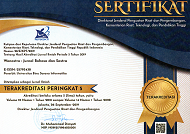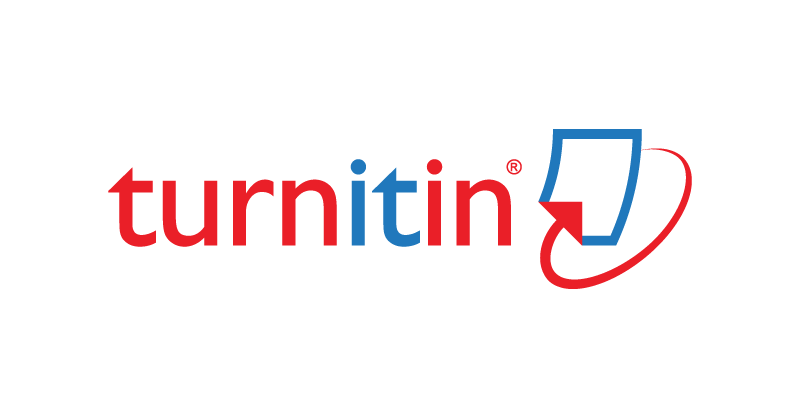ELSA Speak as Mobile Assisted Language Learning To Improve Students’ Speaking Skill
Abstract
This study endeavors to explore whether there exists a significant discrepancy in students' speaking proficiency between those instructed with the ELSA Speak application and those without it, among twelfth-grade students at SMAN 6 Kota Serang. Employing a quantitative research approach with a quasi-experimental method, the researcher examined 60 twelfth-grade students from SMAN 6 Kota Serang, comprising 30 students from XII MIPA-6 as the experimental group and another 30 students from XII MIPA-3 as the control group. Data collection methods encompassed observation, pre-tests, treatment, and post-tests. Analysis via t-test yielded revealing results: the mean speaking proficiency score for the experimental group was 76.93, while for the control group it stood at 64.26. Furthermore, the calculated t-value was 8.46, surpassing the critical t-value of 1.67 at a significance level of 5%. This disparity between the obtained t-value and the critical t-value led to the acceptance of the alternative hypothesis (Ha) and the rejection of the null hypothesis (Ho). In essence, the findings suggest a significant disparity in speaking proficiency between the group using the ELSA Speak application and the group without it. Consequently, these results underscore the importance of integrating technology-based language learning tools such as ELSA Speak into educational curricula, as they have demonstrated efficacy in enhancing students' speaking skills and fostering more effective language acquisition.
Key words: ELSA Speak, Speaking Skill, Mobile Assisted Language Learning.
Full Text:
PDFReferences
Akhter, N., Ali, M. ., Siddique, M., & Akram, M. . (2021). The Role and Importance of Communicating Science for Building up Understanding of Science Applications. Multicultural Education, 7(10), 274–281. https://doi.org/10.5281/zenodo.5563105
Creswell, J. W. (2008). Educational Research: Planning, Conducting, and Evaluating Quantitative and Qualitative Research (3rd ed.). Pearson Education, Inc.,.
Elsani, E., Salsabila, R., Indika Putra, M. F., Nabila, N. K., & Nahartini, D. (2023). The Effect of Using Elsa Speak App for First-Semester Students’ English Speaking Proficiency. EDUKATIF : JURNAL ILMU PENDIDIKAN, 5(6), 2644–2655. https://doi.org/10.31004/edukatif.v5i6.5976
Haetami, Z. A. (2023). Gadget Usage Intensity on Students ’ Concentration in English Language Learning. 2nd Annual International Conference on Islamic Education and Language (AICIEL) 2023 “The Future of Learning: Emerging Trends and Innovations in Islamic Education, Science, and Technology,” 239–257. https://ftk.uinbanten.ac.id/journals/index.php/aiciel/article/view/9710
Hartono. (2009). Statistik untuk Penelitian. Pustaka Belajar.
Hughes, A. (2002). Testing for Language Teacher. Cambridge University Press.
Hung, N. Q., Phung, T. K., Hien, P., & Thanh, D. N. H. (2021). AI and Blockchain: Potential and challenge for building a smart E-Learning system in Vietnam. IOP Conference Series: Materials Science and Engineering, 1022(1). https://doi.org/10.1088/1757-899X/1022/1/012001
Jaelani, A., & Zabidi, O. W. (2020). Junior high school students’ difficulties of English language learning in the speaking and listening section. ELT Forum: Journal of English Language Teaching, 9(1), 45–54. https://doi.org/10.15294/elt.v9i1.38287
Jakni. (2016). Metodologi Penelitian Eksperimen Bidang Pendidikan (Alfabeta (ed.)).
Kadamovna, S. N. (2021). The Importance of Speaking Skills for Efl Learners. International Journal of Innovations in Engineering Research and Technology, 8(1), 28–30. https://repo.ijiert.org/index.php/ijiert/article/view/9
Karim, S. A., Hamzah, A. Q. S., Anjani, N. M., Prianti, J., & Sihole, I. G. (2023). Promoting EFL Students’ Speaking Performance through ELSA Speak: An Artificial Intelligence in English Language Learning. Journal of Languages and Language Teaching, 11(4), 655. https://doi.org/10.33394/jollt.v11i4.8958
Kehing, K. L., & Yunus, M. M. (2021). A Systematic Review on Language Learning Strategies for Speaking Skills in a New Learning Environment. European Journal of Educational Research, 10(4), 2055–2065. https://doi.org/10.12973/eu-jer.10.4.2055
Kholis, A. (2021). Elsa Speak App: Automatic Speech Recognition (ASR) for Supplementing English Pronunciation Skills. Pedagogy : Journal of English Language Teaching, 9(1), 01. https://doi.org/10.32332/joelt.v9i1.2723
Ngoc, N. K., Thi, N., & Thanh, M. (2024). TERTIARY STUDENTS ’ PERCEPTIONS ON ELSA SPEAK. European Journal of Applied Linguistics Studies, 7(1), 1–13. https://doi.org/10.46827/ejals.v7i1.483
Nurazizah, S., Amalia, I., & Septiana, T. I. (2023). The Effectiveness of Using Digital Posters Presentation to Enhance Students ’ Speaking Skill. Wanastra : Jurnal Bahasa Dan Sastra, 15(1), 15–21. https://doi.org/https://doi.org/10.31294/wanastra.v15i1.14532
Rajendran, T., & Md Yunus, M. (2021). A Systematic Literature Review on the use of Mobile-assisted Language Learning (MALL) for Enhancing Speaking Skills among ESL and EFL Learners. International Journal of Academic Research in Progressive Education and Development, 10(1), 586–609. https://doi.org/10.6007/ijarped/v10-i1/8939
Samad, I. S., & Ismail, I. (2020). ELSA Speak Application as a Supporting Media in Enhancing Students’ Pronunciation Skill. Majesty Journal, 2(2), 1–7. https://doi.org/10.33487/majesty.v2i2.510
Shadiev, R., & Yang, M. (2020). Review of studies on technology-enhanced language learning and teaching. Sustainability (Switzerland), 12(2). https://doi.org/10.3390/su12020524
DOI: https://doi.org/10.31294/wanastra.v16i1.21750
Copyright (c) 2024 Annisa Nabila Rizqa Putri, Abdul Muin, Tri Ilma Septiana

This work is licensed under a Creative Commons Attribution-ShareAlike 4.0 International License.
Index by:
Published by Department of Research and Community Service (LPPM) Universitas Bina Sarana Informatika by supported Relawan Jurnal Indonesia
Jl. Kramat Raya No.98, Kwitang, Kec. Senen, Jakarta Pusat, DKI Jakarta 10450

This work is licensed under a Creative Commons Attribution-ShareAlike 4.0 International License







